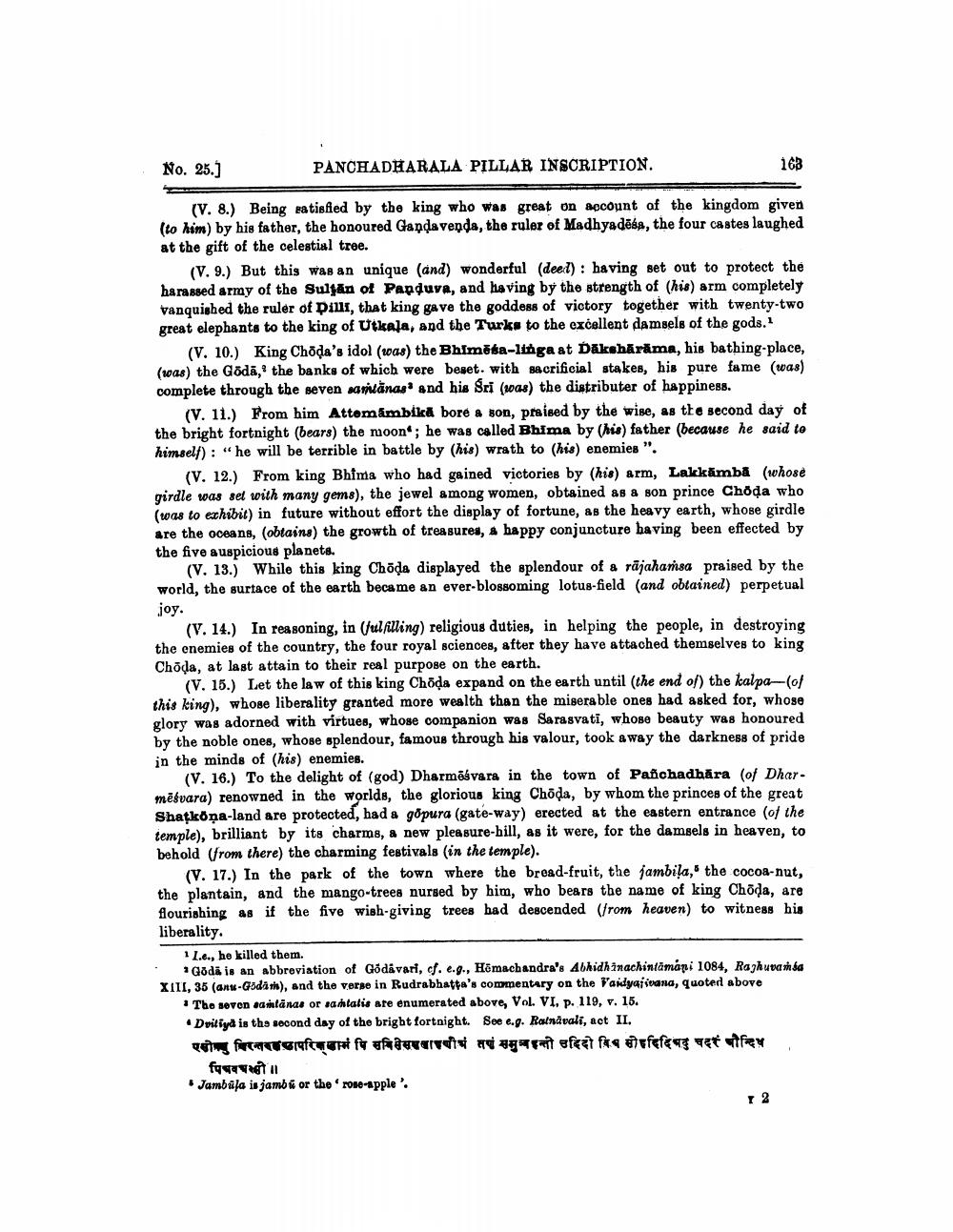________________
No. 25.]
PANCHADHARALA PILLAR INSCRIPTION.
163
(V. 8.) Being satisfied by the king who was great on account of the kingdom given (to him) by his father, the honoured Gandavenda, the ruler of Madhyadesa, the four castes laughed at the gift of the celestial tree.
(V. 9.) But this was an unique (and) wonderful (deed): having set out to protect the harassed army of the Sultan of Panduva, and having by the strength of (his) arm completely vanquished the ruler of pilli, that king gave the goddess of victory together with twenty-two great elephants to the king of Utkala, and the Turks to the excellent damsels of the gods.1
(V. 10.) King Choda's idol (was) the Bhimesa-linga at Däkshärāma, his bathing-place, (was) the Göda, the banks of which were beset. with sacrificial stakes, his pure fame (was) complete through the seven samtanas and his Sri (was) the distributer of happiness.
(V. 11.) From him Attemämbika bore a son, praised by the wise, as the second day of the bright fortnight (bears) the moon; he was called Bhima by (his) father (because he said to himself): "he will be terrible in battle by (his) wrath to (his) enemies ".
(V. 12.) From king Bhima who had gained victories by (his) arm, Lakkamba (whose girdle was set with many gems), the jewel among women, obtained as a son prince Choda who (was to exhibit) in future without effort the display of fortune, as the heavy earth, whose girdle are the oceans, (obtains) the growth of treasures, a happy conjuncture having been effected by the five auspicious planets.
(V. 13.) While this king Chōda displayed the splendour of a rajahamsa praised by the world, the surtace of the earth became an ever-blossoming lotus-field (and obtained) perpetual joy.
(V. 14.) In reasoning, in (fullling) religious duties, in helping the people, in destroying the enemies of the country, the four royal sciences, after they have attached themselves to king Choda, at last attain to their real purpose on the earth.
(V. 15.) Let the law of this king Chōda expand on the earth until (the end of) the kalpa-(of this king), whose liberality granted more wealth than the miserable ones had asked for, whose glory was adorned with virtues, whose companion was Sarasvati, whose beauty was honoured by the noble ones, whose splendour, famous through his valour, took away the darkness of pride in the minds of (his) enemies.
(V. 16.) To the delight of (god) Dharmeévara in the town of Pañchadhara (of Dharměsvara) renowned in the worlds, the glorious king Choda, by whom the princes of the great Shatkoṇa-land are protected, had a gopura (gate-way) erected at the eastern entrance (of the temple), brilliant by its charms, a new pleasure-hill, as it were, for the damsels in heaven, to behold (from there) the charming festivals (in the temple).
(V. 17.) In the park of the town where the bread-fruit, the jambila, the cocoa-nut, the plantain, and the mango-trees nursed by him, who bears the name of king Chōda, are flourishing as if the five wish-giving trees had descended (from heaven) to witness his liberality.
1 L.e., he killed them.
Göda is an abbreviation of Godavari, cf. e.g., Hömachandra's Abhidhanachintamani 1084, Raghuvamsa XIII, 35 (anu-Godam), and the verse in Rudrabhatta's commentary on the Vaidyajivana, quoted above
The seven samtanas or samtalis are enumerated above, Vol. VI, p. 119, v. 15. Dvitiya is the second day of the bright fortnight. See e.g. Rainavali, act II.
eding faracesafqani fa afaâaaraddad each feet fa infefeng wet difer पिश्रव
।
Jambula is jambú or the rose-apple'.
r 2




